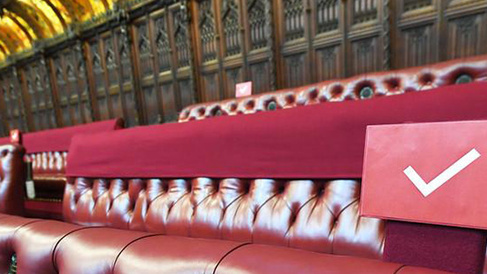
The future of university science research funding was the subject of debate in the House of Lords following the report from the Science and Technology Select Committee titled ‘Science research funding in universities’.
Professor Lord Robert Mair, a member of the House’s Select Committee on Science and Technology, and Head of CSIC, contributed to the session that took place on 9 September.
We strongly recommended that the Government should communicate to the EU and the rest of the world that the UK is committed to continuing international research collaborations after it has left the EU
Professor Lord Robert Mair
The findings of the report, published in August 2019, were introduced by Lord Patel, Chair of the Committee, who drew attention to the Augar review of higher education which was published during the inquiry. Lord Patel said: “The committee looked at the recommendations of the Augar report in the context of research funding in universities. We were more than surprised to hear that, in making its recommendations, the review had not considered the impact they would have on universities’ ability to conduct science research—one of the key roles of universities. Furthermore, it did not think it within its remit to do so.”
The Committee’s report noted that Quality-Related (QR) funding had fallen by 12.8 per cent in real terms since 2010, resulting in a deficit for universities, and recommended that the Government should commit to addressing the deficit. A number of peers contributed to the debate highlighting the importance of retaining the mobility of researchers in order to attract the best talent to the UK and matching the level of science research funding received from the EU.
Addressing the House, Lord Mair cited the effects of Brexit and its implications for future science funding.
“Our report urged the Government to associate the UK with Horizon Europe, which will operate 2021-27, as soon as possible. This will ensure certainty and stability for researchers in universities and industry. We strongly recommended that the Government should communicate to the EU and the rest of the world that the UK is committed to continuing international research collaborations after it has left the EU.”
Lord Mair also cited the Smith-Reid review of international research collaboration, published shortly after the conclusion of the Committee’s report, which describes research and innovation as towering strengths of the UK respected throughout the world and notes the crucial importance of international collaboration to maintain this success. He said: “The review highlighted the consensus of the academic, business and charity communities that the UK should fully associate with Horizon Europe. Full association with Horizon Europe will ensure access to the European Research Council, which has been crucial to the success of UK science in recent decades, but whether this will happen will depend on negotiations with the EU.”
Pointing out the risk to UK science if the UK falls out of European research programmes at the end of 2020, Lord Mair welcomed the recently published Government R&D road map stating the intention to cement the UK as a science superpower.
Quoting the road map, which reaffirmed the Government’s pledge to increase R&D spending to £22 billion by 2024-25, Lord Mair addressed a question to Lord Callanan, the Parliamentary Under-Secretary of State, Department for Business, Energy and Industrial Strategy, who was responding on behalf of the Government, asking: “Can the Minister confirm what is indicated in the R&D road map: that whatever option is chosen, science research funding of international collaborations with EU researchers and others will not be diminished post Brexit?
Responding to the debate, Lord Callanan said he wanted to reassure the House that “fostering international partnerships and global collaboration will play an important part in helping to achieve our ambitions to make the UK the international partner of choice for cutting-edge scientific and research discovery. We have made it clear in the road map that we aim to maintain a close and friendly relationship with our European partners, seeking to agree a fair and balanced deal for participation in Horizon Europe and Euratom research and training programmes.”
Bringing the session to a close, Lord Patel said: “We look forward to the spending review and what the Government have to say about funding research.”
• Read the full Hansard report.
